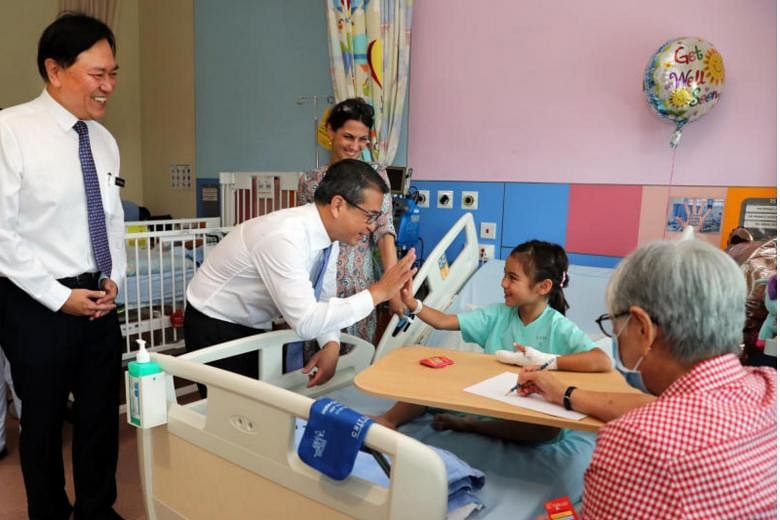SINGAPORE - Singaporeans with three forms of rare diseases now have access to financial aid to help with medical expenses which can run into thousands of dollars each month.
Launched on Tuesday (July 2) by the Ministry of Health (MOH) and SingHealth Fund, the Rare Disease Fund (RDF) will, for a start, fund five medicines used to treat the three conditions - primary bile acid synthesis disorder, Gaucher disease and Hyperphenylalaninaemia due to tetrahydrobiopterin (BH4) deficiency.
The hope is that over time more rare diseases and medications will be added to the list, an MOH statement said on Tuesday (July 2).
Rare diseases are defined by MOH as conditions that affect fewer than one in 2,000 people, and mostly are genetic and often surface during childhood.
In some cases, effective treatments are available and the medicines can substantially increase patients' life expectancy and improve their quality of life.
However, MOH noted that these medicines can be very costly, going up to hundreds of thousands of dollars a year, and patients will often need to take the medicines for their entire lifetime.
"For many families it is a strain, and for some, it is completely out of reach," said Mr Edwin Tong, Senior Minister of State for Health and Law, at the launch.
He said the RDF would extend "much needed help" to those with rare diseases and improve their access to life-saving medicines.
The RDF supports patients whose treatment costs remain unaffordable even after government subsidies, insurance payouts and financial assistance such as Medication Assistance Fund and MediFund.
Mr Tong said "the commitment is that we will ensure the patient gets the treatment" even though each case of a beneficiary will be continually reviewed as the costs for drugs or family situations may change.
The RDF currently stands at $70 million with the government matching community donations by three to one. In addition, the government is funding all operational expenses of managing the fund, ensuring that all donations received will be used solely for supporting patients.
"By providing 3-to-1 donation matching, we hope that the larger community including philanthropists, companies, community groups and individuals will come together to jointly support these patients and their families as part of our caring and inclusive society," Mr Tong said.
Mrs Laura Hwang, who chairs the RDF Committee, also encouraged the public to support patients with rare diseases by donating generously.
She said: "For all of us who have children, we've gone through this experience when your child is first delivered: you look at the fingers and toes and you're so happy to see 10 in 10 are all there... but for some rare cases, the missing link, the symptoms, only appear later."
As of Tuesday, the RDF has approved two applications for support.
Mr Geoffrey Toi Xian Jun, 35, a public servant whose son Christopher suffers from primary bile acid synthesis disorder, is one of them.
Christopher was diagnosed with the disease at six months old. The condition interferes with the production of bile acids and can lead to liver failure if untreated. Christopher, now two, needs the medicine, cholic acid, for life and the family is "very thankful" for the support from the RDF, which will cover a portion of the medication cost, which is currently about $6,250 a month.
The second beneficiary is Mr Chew Tuck Choy, a 39-year-old hotel guest services supervisor, who has an 11-year-old daughter, Zecia, who suffers from Gaucher disease, a condition which causes a build-up of fatty substances in various organs leading to severe bloating. It affects only a handful of children in Singapore.
Zecia requires fortnightly enzyme replacement therapy for life, which costs more than $24,000 per month. Last year, the family began receiving insurance payouts for Zecia's treatment. Together with money from Mr Chew's Medisave and now support from the RDF, the family does not need to fork out cash for the medication. Asked by The Straits Times how he felt upon receiving word that he was receiving support from the RDF, Mr Chew blurted: "Delighted! No words can describe!"
But Mr Chew also said that while the financial support was welcome, emotional support from the community was crucial as well.
Echoing Mr Chew, Mr Kenneth Mah, who is the vice-president of the Rare Disorders Society of Singapore (RDSS), also commended the new initiative, but emphasised that "just having a fund will not solve everything".
The RDSS aims to complement the fund through activities for caregivers and siblings of patients.
Applications have opened for patients in need of the five approved medicines. All donations to the RDF will be eligible for a 250 per cent tax reduction. They may be made through this website.
More information on the RDF is available at this website.

